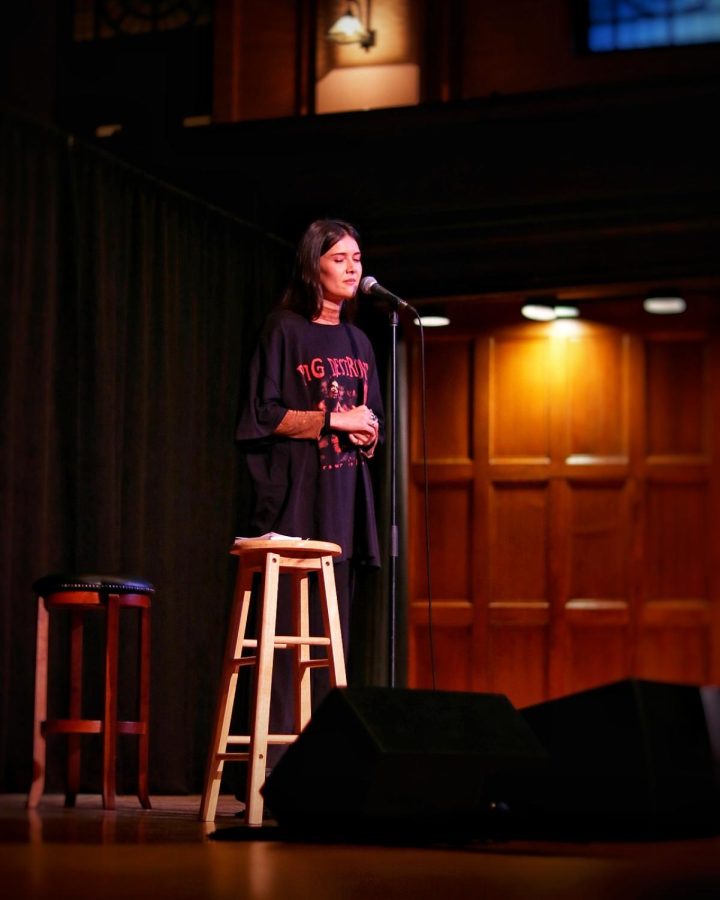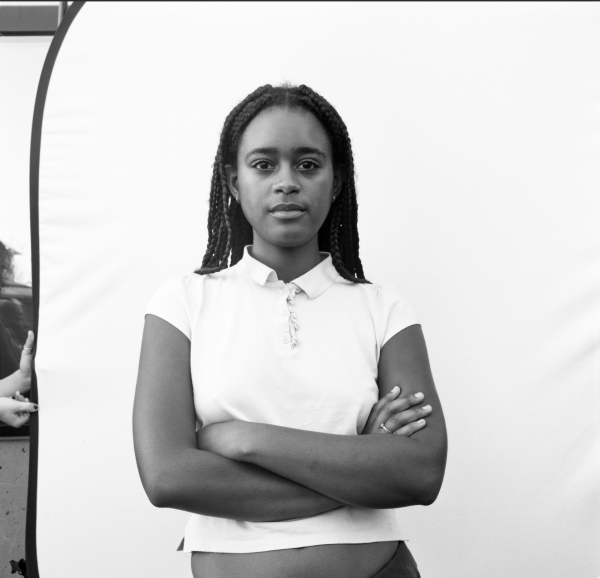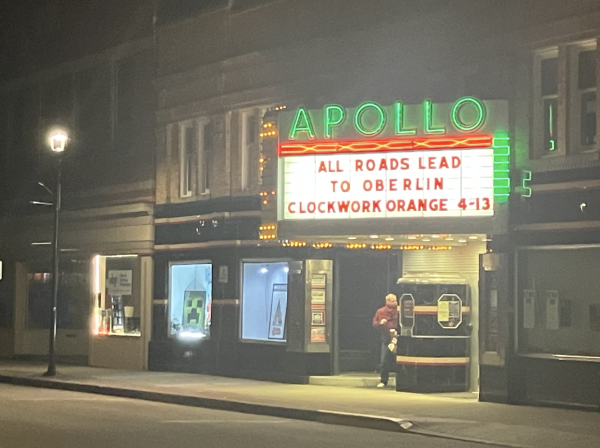Comedian, Actress Patti Harrison Thinks You Should Focus On What Makes You Laugh
Patti Harrison at Finney Chapel on May 4.
Comedian and actress Patti Harrison is most known for her work on the Netflix series I Think You Should Leave with Tim Robinson and Big Mouth. In addition, she recently wrapped production for the third season of Hulu’s Shrill, in which she plays comedian Aidy Bryant’s coworker. According to Rolling Stone, she is “poised to become the most visible working trans comedian in America,” and she was honored as one of Variety’s 2019 “10 Comics to Watch.” She has been profiled by The New York Times, GQ, Interview, Time, Vulture, NYLON, and BUST magazines and can be seen on Paul Feig’s feature A Simple Favor and television shows High Maintenance, Search Party, and Full Frontal. Harrison performed at Finney Chapel on May 4, an event opened by student stand-up comics.
This interview has been edited for length and clarity.
How did you first get into comedy?
When I was in college, I had never been to a live comedy show. A friend who was a year older than me who did improv was like, ‘I think you would be good at this.’ So I went to one of their shows and I thought it was really funny. It was just at a coffee shop on our campus. And I auditioned and I got into one of the teams — there were like two different teams — and they were called Until Like Six to Midnight, which is a joke from Forgetting Sarah Marshall.
When I started improv, it was just to have fun and meet people because I was in the fine art school at the time. And I wanted to do something with design or graphic design or something, but I wasn’t really sure. Then I started taking film and theater classes. But I didn’t necessarily know if comedy was the way to go. And then as I did improv comedy, I really loved performing and I was trying to figure out if improv was something that I could do as a career or at least to supplement a career.
After college, how did you break into the comedy scene? You were in New York, right?
Yes, I moved to New York in May 2015. My friend Mitra lived there and she was taking classes at [Upright Citizens Brigade] and had friends in the comedy scene and then they asked me to do a show. Literally no one went. I think my roommate at the time went and then one other person and then everyone else at the show were people who were waiting to perform. But it was really fun. But I was like, ‘Okay, I would do one show.’ But then one person would be at that show who ran another little cafe bar show and they would ask me to do a show. So it just snowballed in that way. I was just doing a million tiny shows. But then those million tiny shows eventually started to pick up some traction and things started to come together.
Is there anything that you’re working on right now that you’re excited about?
Right now, I’m focusing on getting back into doing live shows and stand-up again, because I didn’t perform for most of lockdown. I did a couple of Zoom shows, where you could kind of pre-prepare a video and just send it in, but I definitely stopped doing live stand up shows because I live in Los Angeles and it was during the pandemic. There were a lot of outdoor shows happening, a lot more than were probably happening in other places just because LA’s weather is pretty consistently warm year round. So that was good for the pandemic, but I just felt really depressed and scared. I don’t think that was a unique feeling, but I definitely didn’t feel creative or inspired.
During lockdown, I was doing a lot of animated stuff, like voiceovers. And it was so easy to do because I could literally sit under a blanket in my bed and record on a microphone under a sheet. That would just be my day’s work, my paycheck for the week, so I felt very fortunate during the pandemic. But animation takes a long time, there’s a couple of things that I worked on that have come out since but I think there’s other stuff that might be coming out. I’m not sure, because sometimes you work on something and it just never comes out. Which is gorgeous.
What is your advice for students who are aspiring to do comedy after college?
I will say that the question you should be asking is ‘What makes you laugh? What makes you, capitalize-underscore, YOU laugh?’ But balance that out with what other people like. Balance is key. Comedy is a scarily tricky medium. I think a lot of art is personal, of course. It’s expressive, but I think that’s what makes comedy a little more dangerous in terms of your own mental health, you don’t know what other people will like. I don’t know if I’ve ever identified as a stand-up comedian, because when I started doing comedy, I was doing character bits on stage. Since then, I’ve just been lumped into stand-up because I’ve performed on a bunch of stand-up shows. So then my sets have kind of leaned into that.
I think comedy is mostly people commodifying their personality, which is such an intimate thing. It’s not like when you make music. You’re not fully communicating through singing, you’re using the tool that is your expressive medium. In other, administrative parts of your life, there is a separation. But in comedy, that line is a lot thinner. When you’re doing comedy and using your sense of humor, your personality is something that then becomes your shtick, or an extension of your shtick or something like that. When you start bending that too much to accommodate what you think other people will like, that takes an emotional toll. And I think you start diluting what makes your work, or point of view, special. Like I started to say earlier, in comedy there are quotation marks around the word success.
When you do that thing that only you can do with the point of view that only you have, you connect with people more deeply and it’s more meaningful and feels better in your heart. As a creative person who is trying to express things, it feels better to be authentic than to water down your material to make it super accessible, just because you want to book something. I’ve found that when I’ve worked on bigger projects where I’ve had to bend to make jokes that I didn’t really think were funny, just for a paycheck, it didn’t pan out. It’s good to support yourself, but always keep in mind what makes you laugh.
At Oberlin, there’s almost like a cult following behind I Think You Should Leave. Do you have a favorite sketch? What was your favorite part about working on it?
I love hanging out with Tim [Robinson] and Zach [Kanin]. They’re so, so, so, funny. And watching them together is very cute. They have a very beautiful rapport and they’re just very giggly and silly. It just feels like a reminder of why I wanted to do comedy. Working just feels like being really goofy and not worrying about making some profound point with your work, which I think a lot of people in comedy get caught in. I didn’t write any of the sketches I’ve been in, they’ve always sent them to me. I’m usually confused as soon as I read it. I’m like, ‘What is this s**t? What the f**k is this about? I don’t f**king get it.’ But now it’s like a fun surprise. I’m like, ‘I have no idea what the f**k they’re gonna make me do.’
But I just feel really fortunate because it has been such a nice thing to be a part of. I love the Vanessa Bayer brunch sketch. I love the esoteric Tim Heidecker trivia night where he talks about the gazpacho and burns his mouth. There are one million that I think are great, but I think about the gazpacho thing a lot. And then I just love the opening of the first sketch of the first season, when Tim is struggling to pull the door. Hilarious.









